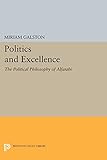Politics and Excellence : The Political Philosophy of Alfarabi / Miriam Galston.
Material type: TextSeries: Princeton Legacy Library ; 1132Publisher: Princeton, NJ : Princeton University Press, [2014]Copyright date: ©1990Edition: Course BookDescription: 1 online resource (254 p.)Content type:
TextSeries: Princeton Legacy Library ; 1132Publisher: Princeton, NJ : Princeton University Press, [2014]Copyright date: ©1990Edition: Course BookDescription: 1 online resource (254 p.)Content type: - 9780691604169
- 9781400861491
- 320.01
- B753.F34 -- G35 1990eb
- online - DeGruyter
- Issued also in print.
| Item type | Current library | Call number | URL | Status | Notes | Barcode | |
|---|---|---|---|---|---|---|---|
 eBook
eBook
|
Biblioteca "Angelicum" Pont. Univ. S.Tommaso d'Aquino Nuvola online | online - DeGruyter (Browse shelf(Opens below)) | Online access | Not for loan (Accesso limitato) | Accesso per gli utenti autorizzati / Access for authorized users | (dgr)9781400861491 |
Frontmatter -- CONTENTS -- ACKNOWLEDGMENTS -- NOTE ON TRANSLITERATION, CITATION, AND TRANSLATION -- INTRODUCTION -- CHAPTER I. Alfarabi's Method of Writing -- CHAPTER II. The Problem of Happiness -- CHAPTER III. The Royal Craft -- CHAPTER IV. Cities of Excellence -- CHAPTER V. The Autonomy of Political Science -- Bibliography -- INDEX
restricted access online access with authorization star
http://purl.org/coar/access_right/c_16ec
Widely recognized as one of the most original and profound philosophers that the medieval Islamic world produced, Alfarabi (870-950) wrote many works of political philosophy addressing the issues that dominated Greek political thought as well as new questions raised by the advent of revealed religion. Taking into account Alfarabi's major political treatises, Miriam Galston develops a theory explaining how together they form a coherent philosophy of politics. Her inquiry centers on Alfarabi's discussions of the nature of happiness, the attributes of ideal rulers, the best form of government, and the relationship between political science and theoretical inquiry. Based upon a new interpretation of Alfarabi's method of writing, Galston explores his use of dialectic, which she traces, in part, to his belief that personal discovery is a condition of philosophic understanding and to his desire to create for the reader a dialogue between Plato and Aristotle.Originally published in 1990.The Princeton Legacy Library uses the latest print-on-demand technology to again make available previously out-of-print books from the distinguished backlist of Princeton University Press. These editions preserve the original texts of these important books while presenting them in durable paperback and hardcover editions. The goal of the Princeton Legacy Library is to vastly increase access to the rich scholarly heritage found in the thousands of books published by Princeton University Press since its founding in 1905.
Issued also in print.
Mode of access: Internet via World Wide Web.
In English.
Description based on online resource; title from PDF title page (publisher's Web site, viewed 30. Aug 2021)


